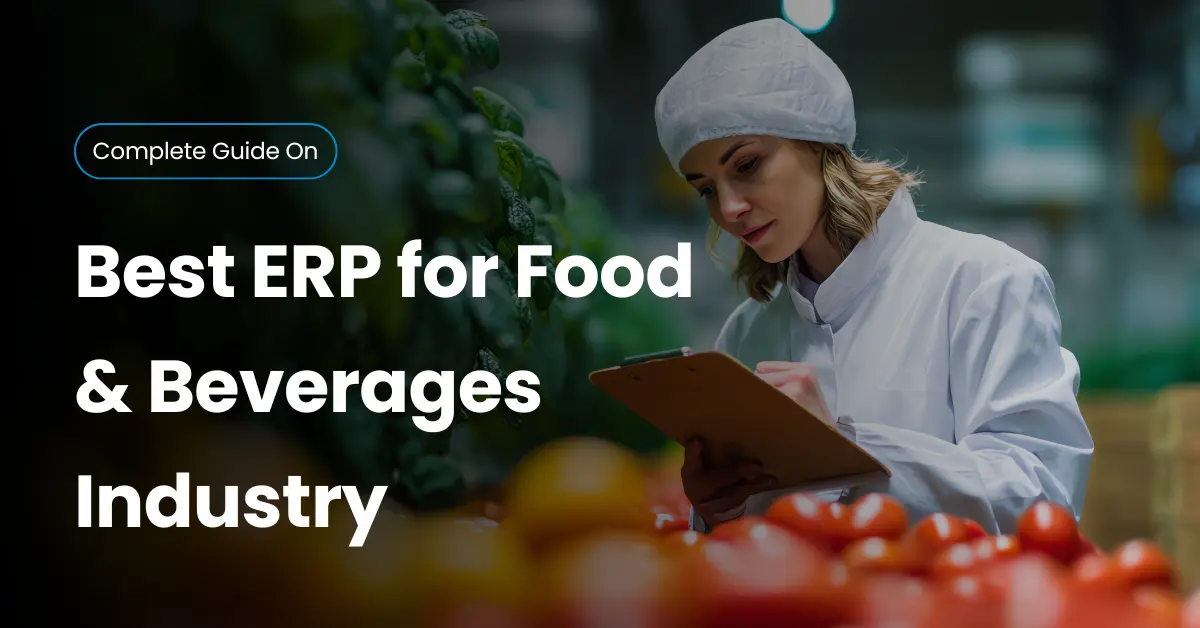In the food and beverage world, efficiency isn’t just about speed — it’s about precision. Every ingredient, batch, and compliance report matters. That’s where ERP software steps in. The right system connects your production, accounting, and supply chain into one integrated flow, reducing waste and improving profitability.
For U.S. food manufacturers, adopting the best ERP software for the food industry isn’t a luxury — it’s a necessity. From FDA regulations to shelf-life tracking, food businesses need visibility and control across every stage of production. Let’s break down how today’s ERP systems for food & beverage are reshaping the way manufacturers work, stay compliant, and scale efficiently.
Why ERP Software Matters for Food & Beverage Companies
Modern food manufacturers juggle thousands of moving parts — perishable inventory, strict regulations, and demand swings. Without an organized system, one small data gap can snowball into waste, recalls, or compliance penalties. An ERP solution for the food industry helps keep every department aligned — from purchasing to packaging.
In practice, food & beverage ERP systems centralize production data, automate compliance tracking, and provide real-time visibility into operations. Instead of juggling spreadsheets and separate tools, you get a single source of truth that improves decision-making and accountability across your entire team.
Common Pain Points Solved by ERP
Manual batch tracking and disconnected systems are still common in mid-sized U.S. plants. ERP changes that.
It solves issues like inconsistent recipe formulation, delayed reporting, and poor inventory control. Businesses can now trace every batch, flag quality issues early, and generate audit-ready reporting — all from one dashboard.
For example, a Midwest dairy producer reduced compliance errors by 40% after switching to an integrated ERP solution that connected production and quality control teams.
Key Features of the Best ERP Software for Food Manufacturers
The best ERP for food manufacturers goes beyond accounting. It’s built around how real food processors work — with modules for production, compliance, and cost control. Here’s what to look for.
- Recipe & Batch Management: Maintain version control, automate scaling, and streamline formula management for each product line.
- Quality Assurance: Monitor product safety, allergen testing, and lot approvals using built-in quality control tools.
- Inventory Tracking: Track perishable goods by lot and manage storage based on expiration and shelf life.
- Production Scheduling: Automate batch runs, forecast ingredient demand, and reduce downtime.
- Financial Management: Connect ERP modules to accounting and track profitability across departments.
- Cloud ERP Access: Monitor operations from anywhere with secure, mobile-friendly dashboards.
That said, the real advantage comes from integration. A well-designed integrated ERP solution ties your production floor to finance, purchasing, and compliance — helping your team make faster, smarter decisions.
Food & Beverage ERP Systems in Action
Real-world results show how transformative the right system can be. Let’s look at two quick examples from U.S. manufacturers using modern food manufacturing ERP platforms.
Example 1: A regional beverage brand cut waste by 30% after introducing automated lot tracking and real-time inventory management.
Example 2: A frozen foods exporter improved delivery accuracy and reduced recall risk using automated traceability and regulatory compliance alerts built into their ERP.
Here’s the key takeaway: the right ERP isn’t just software — it’s a long-term operational advantage. When done right, it pays for itself in fewer errors, better data, and consistent product quality.
ERP Comparison for F&B — 2025 Edition
Choosing the best ERP for food processors depends on your company’s size, product range, and operational complexity. Some manufacturers need flexibility and cost-effectiveness, while others prioritize scalability and integration with existing systems.
To make your decision easier, here’s a practical ERP comparison for food companies, outlining key strengths and ideal use cases for 2025.
| ERP Software | Key Strength | Ideal For | Pricing Model | Deployment |
| ERPNext | Open-source flexibility and community-driven support | Small to mid-sized food manufacturers | Affordable (per user) | Cloud / On-premise |
| Odoo ERP | Modular customization with strong add-on marketplace | Growing food & beverage processors | Per user/module | Cloud |
| SAP Business One | Enterprise-grade scalability with regulatory compliance tools | Large manufacturers with multiple plants | Premium | On-premise |
| Microsoft Dynamics 365 | Deep integration with Office and CRM tools | Distributors and multi-state food operations | Subscription-based | Cloud |
| Infintrix ERP Solution | Tailored ERP for food & beverage with built-in traceability and batch control | Manufacturers of any scale | Custom pricing | Cloud / Hybrid |
Each system has unique advantages. For smaller companies, ERPNext and Odoo offer flexibility and low cost. Larger enterprises may prefer SAP or Microsoft Dynamics for their enterprise-level control. Infintrix’s food industry ERP bridges both worlds — flexible enough for small processors, yet powerful enough for complex production environments.
ERP Selection Criteria for Food Industry
Finding the right ERP solution takes more than comparing price tags. It’s about matching technology to your process manufacturing needs. Here’s a straightforward framework to help you evaluate.
First, identify your biggest operational pain points — such as production inefficiencies, inventory loss, or compliance tracking gaps. Then, look for a cloud ERP that integrates accounting, manufacturing, and quality control without extensive add-ons or coding.
Selection checklist:
- Choose software designed for process manufacturing, not generic retail.
- Confirm built-in traceability and recall management features.
- Verify regulatory compliance for FDA, FSMA, and USDA standards.
- Check for multifacility support if you operate in multiple states.
- Assess scalability and vendor experience in the food industry.
Here’s the key takeaway: a well-matched ERP solution for food industry needs to fit your processes — not the other way around.
Pro Tip: Shortlist 2–3 vendors and schedule demos. Infintrix Technologies offers free consultations to help compare platforms and identify the right setup for your operation.
Traceability & Compliance in ERP
In the food business, traceability isn’t optional — it’s your shield against recalls and regulatory fines. A strong ERP system for food & beverage provides end-to-end visibility from ingredient sourcing to final shipment, giving you full control over every lot, batch, and formulation.
Modern food manufacturing ERP tools automate compliance tracking and provide audit-ready reporting that meets FDA and HACCP standards. For example, if a contaminated ingredient is detected, lot tracking pinpoints exactly which batches are affected — minimizing recall impact and ensuring quality assurance remains intact.
That said, the best systems don’t just react to problems — they prevent them. With real-time alerts, digital records, and automated ingredient tracking, your business stays proactive about safety, not just compliant.
ERP Implementation in Food Manufacturing
Rolling out a new ERP deployment in food operations requires planning and patience. But when done right, it transforms how teams collaborate, measure performance, and adapt to new demands.
Follow these steps to implement smoothly:
- Map existing workflows: Document your current production and compliance routines.
- Involve department leads: Production, accounting, and quality teams must align early.
- Test data accuracy: Clean and verify records before migration.
- Train in phases: Hands-on training ensures better adoption.
- Monitor KPIs: Track yield, waste, and downtime post-launch to gauge ROI.
Remember, ERP isn’t a one-time project. Continuous optimization and updates keep your system efficient and aligned with industry standards.
Future Trends in Food ERP Technology
The next wave of ERP for food & beverage is smarter, faster, and more connected. U.S. manufacturers are investing in data-driven platforms to meet changing market expectations.
Here’s what’s shaping the future:
- AI forecasting for better demand planning
- IoT monitoring for equipment and temperature tracking
- Blockchain for transparent supplier data and traceability
- Sustainability analytics for waste and energy management
- Real-time MES integration for production control
These innovations don’t just improve efficiency — they redefine what modern manufacturing can achieve.
Conclusion — Streamline Your Food Business with the Right ERP Partner
The right ERP software for food & beverages can help companies to stay competitive, compliant, and efficient in a rapidly evolving market. From managing recipes to ensuring regulatory compliance, ERP simplifies every part of production and reporting.
At Infintrix Technologies, we specialize in customized ERP solutions for food manufacturers across the U.S. — from local processors to enterprise exporters. Our systems include modules for traceability, cost tracking, and automated compliance reporting. Talk to an ERP expert today to find the ideal solution for your business.
Frequently Asked Questions
Q1: How much does ERP software for the food industry cost?
It varies. Small businesses can expect around $50–$150 per user/month for cloud options. Enterprise-grade systems like SAP can reach $25,000+ annually, depending on customization.
Q2: Which ERP is best for small food manufacturers?
ERPNext or Odoo are cost-effective options. Infintrix Technologies customizes ERP modules for small processors, making enterprise-grade features accessible to smaller teams.
Q3: How long does ERP implementation take?
Typically, 3–6 months depending on company size, data migration, and training scope.
Q4: What makes food industry ERP different from general ERP systems?
Food ERPs include batch control, allergen management, and FDA/USDA compliance tracking — critical for perishable goods and quality control.
Q5: How does Infintrix Technologies support ERP success?
We assist from selection to customization and training, ensuring your ERP system fits your exact production and compliance needs.

